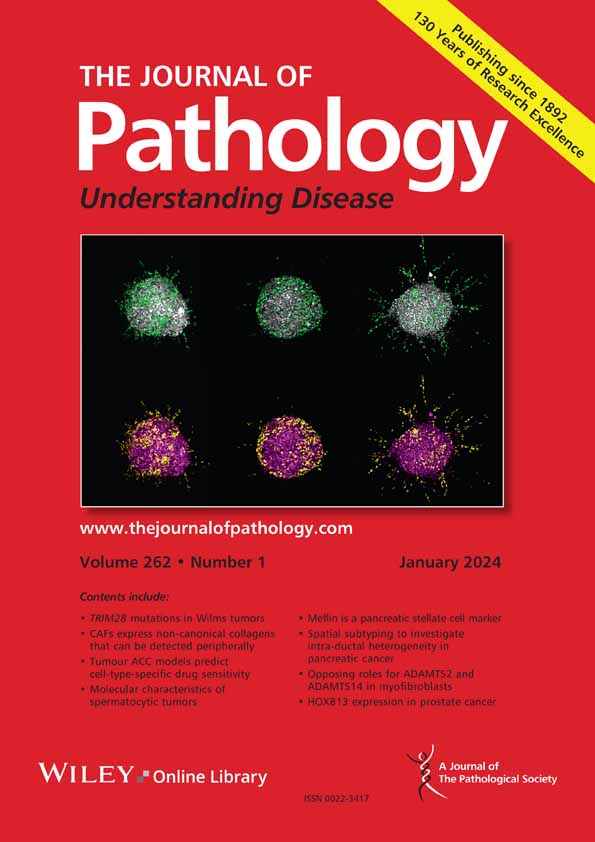Yuedian Ye, Yuanpeng Liao, Yifan Zhang, Jianqiang Zhang, Mayao Luo, Qiao Yang, Qiliang Zhai, Zhuofan Xu, Yutong Wang, Haoran Wen, Chenwei Wu, Yang Qiu, Shidong Lv, Qiang Wei
求助PDF
{"title":"KMT2D deficiency potentiates antitumor immunity and sensitizes immune checkpoint blockade in urologic cancers.","authors":"Yuedian Ye, Yuanpeng Liao, Yifan Zhang, Jianqiang Zhang, Mayao Luo, Qiao Yang, Qiliang Zhai, Zhuofan Xu, Yutong Wang, Haoran Wen, Chenwei Wu, Yang Qiu, Shidong Lv, Qiang Wei","doi":"10.1002/path.6481","DOIUrl":null,"url":null,"abstract":"<p><p>Immune checkpoint blockade (ICB) therapy has made remarkable advances in cancer treatment. However, the overall response rate remains limited. Here, we aim to explore the role of histone 3 lysine 4 mono-methyltransferase KMT2D in tumor immune response and improve the efficacy of ICB. We developed a patient-derived urologic tumor fragment (PDUTF) platform comprising 56 tumors and constructed three major urological tumor tissue microarrays from 356 patients. Analyzed using the PDUTF platform and tissue microarrays (TMAs), we found that tumors with KMT2D deficiency were associated with enhanced T-cell activation in response to anti-PD-1 therapy and exhibited increased T-cell infiltration. Subsequently, T-cell migration and T-cell-mediated tumor cell killing assays revealed that the deletion of KMT2D in cancer cells promoted CD8<sup>+</sup> T-cell migration and cytotoxicity against tumor cells. Mechanistically, the loss of KMT2D enhanced antitumor immunity by promoting chemokine-mediated recruitment of T cells both in vitro and in vivo. Finally, the small-molecule inhibitor MI-503 combined with anti-PD-1 therapy suppressed tumor growth on the PDUTF platform. Collectively, KMT2D deficiency sensitizes tumor cells to ICB, and inhibiting KMT2D may represent a promising approach in combination with ICB to improve patient prognosis. © 2025 The Pathological Society of Great Britain and Ireland.</p>","PeriodicalId":232,"journal":{"name":"The Journal of Pathology","volume":" ","pages":""},"PeriodicalIF":5.2000,"publicationDate":"2025-10-06","publicationTypes":"Journal Article","fieldsOfStudy":null,"isOpenAccess":false,"openAccessPdf":"","citationCount":"0","resultStr":null,"platform":"Semanticscholar","paperid":null,"PeriodicalName":"The Journal of Pathology","FirstCategoryId":"3","ListUrlMain":"https://doi.org/10.1002/path.6481","RegionNum":2,"RegionCategory":"医学","ArticlePicture":[],"TitleCN":null,"AbstractTextCN":null,"PMCID":null,"EPubDate":"","PubModel":"","JCR":"Q1","JCRName":"ONCOLOGY","Score":null,"Total":0}
引用次数: 0
引用
批量引用
Abstract
Immune checkpoint blockade (ICB) therapy has made remarkable advances in cancer treatment. However, the overall response rate remains limited. Here, we aim to explore the role of histone 3 lysine 4 mono-methyltransferase KMT2D in tumor immune response and improve the efficacy of ICB. We developed a patient-derived urologic tumor fragment (PDUTF) platform comprising 56 tumors and constructed three major urological tumor tissue microarrays from 356 patients. Analyzed using the PDUTF platform and tissue microarrays (TMAs), we found that tumors with KMT2D deficiency were associated with enhanced T-cell activation in response to anti-PD-1 therapy and exhibited increased T-cell infiltration. Subsequently, T-cell migration and T-cell-mediated tumor cell killing assays revealed that the deletion of KMT2D in cancer cells promoted CD8+ T-cell migration and cytotoxicity against tumor cells. Mechanistically, the loss of KMT2D enhanced antitumor immunity by promoting chemokine-mediated recruitment of T cells both in vitro and in vivo. Finally, the small-molecule inhibitor MI-503 combined with anti-PD-1 therapy suppressed tumor growth on the PDUTF platform. Collectively, KMT2D deficiency sensitizes tumor cells to ICB, and inhibiting KMT2D may represent a promising approach in combination with ICB to improve patient prognosis. © 2025 The Pathological Society of Great Britain and Ireland.
KMT2D缺陷增强了泌尿系统癌症的抗肿瘤免疫并使免疫检查点阻断增敏。
免疫检查点阻断(ICB)疗法在癌症治疗方面取得了显著进展。然而,总体回复率仍然有限。本研究旨在探讨组蛋白3赖氨酸4单甲基转移酶KMT2D在肿瘤免疫应答中的作用,提高ICB的疗效。我们开发了一个患者衍生的泌尿系统肿瘤片段(PDUTF)平台,包括56个肿瘤,并构建了356例患者的三个主要泌尿系统肿瘤组织微阵列。利用PDUTF平台和组织微阵列(TMAs)进行分析,我们发现KMT2D缺陷的肿瘤在抗pd -1治疗的反应中与t细胞活化增强相关,并表现出t细胞浸润增加。随后,t细胞迁移和t细胞介导的肿瘤细胞杀伤实验显示,癌细胞中KMT2D的缺失促进了CD8+ t细胞的迁移和对肿瘤细胞的细胞毒性。在机制上,KMT2D的缺失通过促进趋化因子介导的T细胞在体外和体内的募集来增强抗肿瘤免疫。最后,小分子抑制剂MI-503联合抗pd -1治疗在PDUTF平台上抑制肿瘤生长。总的来说,KMT2D缺陷使肿瘤细胞对ICB敏感,抑制KMT2D可能是一种有希望的方法,可以联合ICB改善患者预后。©2025英国和爱尔兰病理学会。
本文章由计算机程序翻译,如有差异,请以英文原文为准。

 求助内容:
求助内容: 应助结果提醒方式:
应助结果提醒方式:


